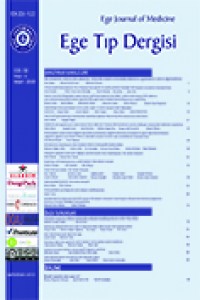Pediyatrik vakalarda sürekli akım sağlayan ventrikül destek cihazi implantasyonu: Tek merkez deneyimi
Öz
Amaç: Kalp
transplantasyonu medikal tedaviye dirençli hastalarda altın standart tedavi
yöntemidir. Tüm dünyada olduğu gibi ülkemizde de özellikle pediatrik yaş
grubunda donör organ kısıtlılığı ve uzayan bekleme listeleri ventrikül destek
sistemlerinin kullanımını zorunlu kılmıştır.
Gereç
ve Yöntem: Bu çalışmada, kliniğimizde Ağustos 2012 ile Mart 2108 tarihleri
arasında 19 yaş altı olgularda devamlı akım sağlayan ventriküler destek cihazı
implante edilmiş olgular retrospektif olarak değerlendirildi. Hastaların tümü
kalp nakli kriterlerine uygundu. Tüm hastalara HeartWare (HeartWare inc.
Medtronic) HVAD cihazı implante edildi.
Bulgular: Yaş ortalaması 15.4
(minimum11-maksimum 18) olan 8 kız, 6 erkek olgunun, ortalama kilosu 42.4 kg,
vücut yüzey alanı ise 1.4 kg/cm², ortalama takip süresi 549 gün, 6 aylık survi
%90 olarak değerlendirildi. Altı (%42.9) olgu halen destek altında takibimizde
iken, 6 olguya başarılı şekilde kalp transplantasyonu yapıldı. Destek altında
iken 2 olgu kaybedildi.
Sonuç: Teknolojik
ilerlemeler ile büyük ve pulsatil akım sağlayan pompalardan sonra son yıllarda
boyutları oldukça küçülen sürekli akım sağlayan ventrikül destek sistemlerinin
kullanımı yaygınlık kazanmıştır. Bu yazımızda kliniğimizde pediatrik yaş
grubunda nakile köprü amaçlı sürekli akım sağlayan ventrikül destek cihazı
implantasyonu deneyimlerimiz paylaşılacaktır.
Anahtar Kelimeler
Kaynakça
- Masarone D, Valente F, Rubino M, et al. Pediatric heart failure: A practical guide to diagnosis and management. Pediatr Neonatol 2017;58(4):303-12.
- Almond CSD, Thiagarajan RR, Piercey GE, et al. Waiting list mortality among children listed for heart transplantation in the United States. Circulation 2009;119(5):717-27.
- Hsu KH, Huang SC, Chou NH, et al. Ventricular assist device application as a bridge to pediatric heart transplantation: A single center's experience. Transplant Proc 2012;44(4):883-5.
- Chambers DC, Yusen RD, Cherikh WS, et al. The Registry of the International Society for Heart and Lung Transplantation: Thirty-fourth Adult Lung And Heart-Lung Transplantation Report-2017; Focus Theme: Allograft ischemic time. J Heart Lung Transplant 2017;36(10):1047-59.
- Blume ED, VanderPluym C, Lorts A, et al. Second annual Pediatric Interagency Registry for Mechanical Circulatory Support (Pedimacs) report: Pre-implant characteristics and outcomes. J Heart Lung Transplant 2018;37(1):38-45.
Öz
Aim:
Heart transplantation is the gold standard of
treatment for patients with medical therapy resistant end-stage heart failure.
Particularly in the pediatric age group use of ventricular asist device (VAD)
is mandatory, due to donor organ limitation and prolonged waiting lists.
Materials
and Methods: This retrospective
review of fourteen patients under 19 years of age who underwent continuous flow
left VAD implantation between August 2012 and March 2018. All patients have met
the criteria for heart transplantation. HeartWare (HeartWare Inc. Medtronic)
HVAD was implanted to all patients.
Results:
There were eight girls and six boys with a mean
overall age of 15.4 (minimum11-maximum 18) years and mean body weight of 42.4
kg and body surface area (BSA) is 1.4 kg/cm². The mean follow-up was 549 days.
Survival rate at six months was 90%. Six patients (42.9%) are still waiting for
transplantation on VAD support. Six patients (42.9%) underwent heart
transplantation successfully. Two patients died while they were waiting for
transplantation on device support.
Conclusion:
The use of continuous flow ventricular assist devices
became more popular because reduced dimensions along with technological
advances. In this article, we wanted to share our experience about continuous
flow ventricular assist device implantation as bridge to transplantation in
pediatric patients.
Anahtar Kelimeler
Kaynakça
- Masarone D, Valente F, Rubino M, et al. Pediatric heart failure: A practical guide to diagnosis and management. Pediatr Neonatol 2017;58(4):303-12.
- Almond CSD, Thiagarajan RR, Piercey GE, et al. Waiting list mortality among children listed for heart transplantation in the United States. Circulation 2009;119(5):717-27.
- Hsu KH, Huang SC, Chou NH, et al. Ventricular assist device application as a bridge to pediatric heart transplantation: A single center's experience. Transplant Proc 2012;44(4):883-5.
- Chambers DC, Yusen RD, Cherikh WS, et al. The Registry of the International Society for Heart and Lung Transplantation: Thirty-fourth Adult Lung And Heart-Lung Transplantation Report-2017; Focus Theme: Allograft ischemic time. J Heart Lung Transplant 2017;36(10):1047-59.
- Blume ED, VanderPluym C, Lorts A, et al. Second annual Pediatric Interagency Registry for Mechanical Circulatory Support (Pedimacs) report: Pre-implant characteristics and outcomes. J Heart Lung Transplant 2018;37(1):38-45.
Ayrıntılar
| Birincil Dil | İngilizce |
|---|---|
| Konular | Sağlık Kurumları Yönetimi |
| Bölüm | Araştırma Makaleleri |
| Yazarlar | |
| Yayımlanma Tarihi | 14 Mart 2019 |
| Gönderilme Tarihi | 24 Mart 2018 |
| Yayımlandığı Sayı | Yıl 2019 Cilt: 58 Sayı: 1 |
Ege Tıp Dergisi, makalelerin Atıf-Gayri Ticari-Aynı Lisansla Paylaş 4.0 Uluslararası (CC BY-NC-SA 4.0) lisansına uygun bir şekilde paylaşılmasına izin verir.

